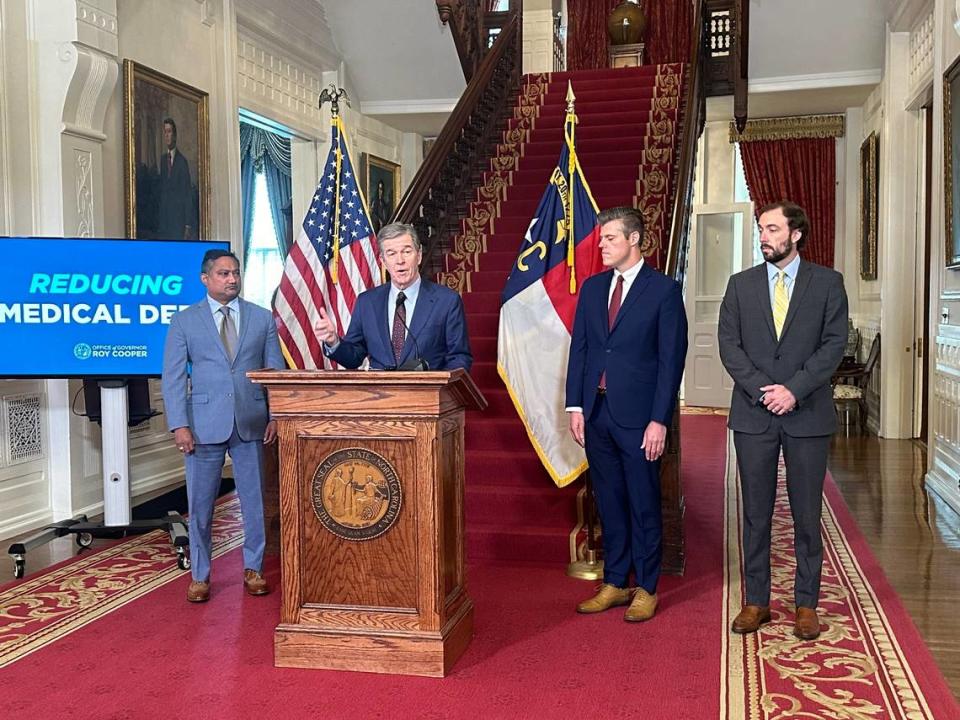Gov. Cooper unveils plan to erase medical debt for up to 2 million in North Carolina
North Carolinians struggling with medical debt could get reprieve under a new proposal unveiled by Democratic Gov. Roy Cooper and state Health and Human Services Secretary Kody Kinsley.
If approved by federal officials, the plan that would leverage federal Medicaid funding to wipe away about $4 billion in hospital medical debt for up to 2 million low to middle-income families in the state, said Cooper on Monday during a news conference.
“It’s not a choice to fall ill with cancer, suffer a heart attack or stroke or have an accident. Medical debt happens because somebody needs help and they can’t afford to pay the hospital bills,” said Cooper.
“North Carolinians should not be saddled with a mountain of debt that they can never repay,” he said.
This request is a next step in the state’s recent expansion of who qualifies for Medicaid healthcare coverage. Hospitals receive a funding boost from Medicaid as part of that expansion and would be expected to grant relief to some medical debt to receive additional funds.
Hospitals often only collect a small fraction of the medical debt they are owed, Cooper said. However, large debts that remain on the books can prevent people from buying a home, getting a credit card and sometimes, can lead people into homelessness and bankruptcy, he said.
North Carolina has one of the highest percentages — 13.4% — of adults with medical debt, according to KFF, a health policy organization. About 20 million people — or nearly 1 in 12 adults — owe a combined total of at least $220 billion in medical debt in the United States, KFF says.
Details on the proposal
The North Carolina Healthcare Association and its members are still reviewing the proposal, spokesperson Cynthia Charles said. They “look forward” to learning how the U.S. Centers for Medicare and Medicaid Services (CMS) responds, she added.
“We believe that the best solutions are always inclusive and transparent, with involvement by all stakeholders, including employers, payors and providers,” Charles wrote in an email to The News & Observer.
The state submitted a request to CMS last week to approve requirements hospitals must meet to be eligible to receive an enhanced amount of Medicaid funds under the state’s Healthcare Access and Stabilization Program (HASP), said Kinsley.

But to compensate hospitals, lawmakers included the HASP mechanism, which allows hospitals to take advantage of a federal program that boosts how much they are paid for serving Medicaid patients.
To qualify for further enhanced payments under the HASP program, hospitals would have to put in place relief for medical debt that dates back to January 1, 2014. This would be specific to low-and middle-income North Carolinians, said Kinsley.
The debt-relief program would apply to individuals across any type of insurance and not solely to people on Medicaid.
“It’s a win for our hospitals to be able to get enhanced payments for more investments in their health care in their work. It’s a win for individuals who will finally have the relief from this burden,” Kinsley said.
Asked whether this could lead to people not paying their medical debt and increased hospital costs, Kinsley said the program “is an even more incentive for hospitals to control costs.”
“With hospitals knowing that for low and middle-income North Carolinians, they’re not going to be able to collect a certain amount, It puts more of an onus on hospitals to negotiate (with insurers) with that in mind,” he said.
As for people defaulting on medical debt, Kinsley said “people are going into a hospital referred into care because they’re making life and death decisions, and we want to make sure that we can keep those life and death decisions at the forefront of their minds.”
Hospitals would also need to ensure that people who are eligible for charity-care programs actually get enrolled, he said. Through charity care, hospitals are supposed to provide free or discounted services to eligible low-income patients. In return, federal, state, and local governments provide funding — including through tax breaks for nonprofit hospitals — in support. The program would also require hospitals not to sell medical debt to collectors.
On whether hospitals will support the plan, Kinsley said: “I know that there’s a lot of difference across our 99 hospitals that participate in this program. They’re all going to think really hard about how they’ll approach it. And we hope that they’ll say yes.”


